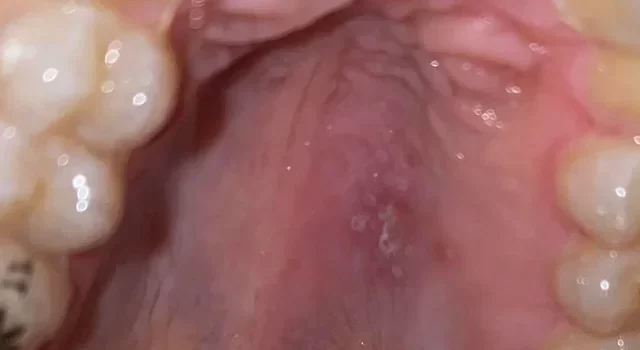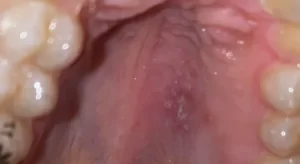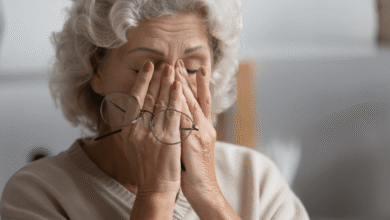What is Roof of Mouth Sore?

The roof of a mouth sore is a painful ulcer that develops on the soft, sensitive tissue on the inside of your mouth. These sores can be hard to diagnose and there is no single cause for them. However, it’s thought that the roof mouth sore is commonly caused by a combination of dry mouth, stress, and burning or spicy food. The good news is that most cases are temporary and will heal without treatment. Here we look at why you might get a roof-of-mouth sore or bumps on the roof of the mouth, their common causes, and how to ease their symptoms if they persist.
Oropharyngeal ulcer (or roof of the mouth sore) is normally caused by infections and can be a serious problem in someone who has sickness or poor oral hygiene. This kind of sore can be painful and difficult to treat because of its location and the number of areas involved.
Roof ulcers are far more common than you may think. They usually do not show up until they have had ample time to develop, oftentimes causing a serious problem. Oftentimes, they can be caused by your teeth grinding against each other or chewing hard foods in the mouth. You may also get mouth ulcers from a medical condition like diabetes or cancer.
How roof of the mouth sore develops?
The roof of the mouth is prone to sores and ulcers because the mouth is a low-pressure environment with high acid content (pH >6). The pH of saliva is around 6.0, which is slightly acidic. The alveolar epithelium lining the back of your mouth has a very thin layer of mucus holding in the mucous (ph) secretions. As this layer of mucous tissue is broken down or worn away over time, less protection against acid reflux exists, resulting in sores.
Prevalence of mouth sores
Mouth roof sores are commonly found in the elderly population. The prevalence of mouth roof sores and ulcers in different geographical regions varies widely, according to numerous surveys conducted around the world. Mouth roof sores are different from other oral ulcers but share similarities with them, including the fact that they can have a painful and distressing effect on their sufferers.

Mouth roof sores are common in elderly patients. The prevalence of mouth roof sores is higher in the elderly compared to young adults, but this difference diminishes with age. There is no single cause of mouth roof sores, but several risk factors have been identified; i.e., smoking, diabetes, and neoplasms. Mouth roof sores can be differentiated into acute and chronic forms. An acute form occurs abruptly following a penetrating tooth trauma or food spill that produces immediate pain and swelling over the affected area for 1-4 weeks. In patients with chronic inflammation, there are redness and swelling of the involved tissue starting from some days after such trauma until resolution at least a year later (2-3 times).
Causes of Roof of mouth sore
Oral ulcers, commonly known as mouth sores, can be caused by a number of factors: The strongest risk factor for developing oral ulcers is poor immune function. This can be triggered directly or indirectly, through stress, which causes an overactive adrenal gland (the ‘stress response’). The roof of mouth ulcers is caused by a number of infections and conditions, including fusiform papillomas, glossitis, and herpes simplex virus.
The roof of the mouth ulcers is due to Oral thrush, Oral polyps (such as verruca, maxillary fistulas, and lymph node hyperplasia), Dental caries and pericoronitis (inflammation of a loop of gum), Gingivitis (clinical signs are minor inflammation with mild redness and scaling), Mouth sores (fungal infection and herpes simplex type 2 [HSV-2] or viral infections such as HIV).
Mouth sores, also known as buccal papillomas, are a common condition. They are often caused by a bacterial infection that the body fights by creating excessive saliva. This can lead to the development of mouth sores and ulcers. There are many other causes of mouth roof sores, but only a few are mentioned here.
1. Diabetes causes mouth sores
Mouth sores and ulcers occur when the lining of your mouth is damaged. They are often confused with canker sores, but they are caused by bacteria than an injury to the capsule or sensitive tissue. Mouth sores can also be a side effect of diabetes. Mouth sores caused by diabetes can be the result of several factors.
The first is a general lack of saliva, which causes dry mouth and tooth decay. Second, high blood sugar means small damage to the soft tissue of the lips and mouth, which promotes infections. While diabetes can cause mouth sores as a result of both of these problems, it’s more common for them to just be one (since patients with only a minor amount of damage still have some other signs).
2. Oral thrush and mouth ulcer
Oral thrush is a cause of frequent mouth sores, ulcers, and bleeding gums. It is a fungal infection of the mouth and throat. The condition can be more common in adults than children because adults are more likely to develop fungal skin infections than children.
Oral thrush, also known as Candida albicans, exists in a number of different forms. Sores appear mainly on the tongue or lips, but may also be found elsewhere in the mouth. Oral thrush can affect both children and adults, although it appears more commonly in children because they are more likely to put their hands and fingers in their mouths. Symptoms of oral thrush include white patches on the tongue or inside cheeks and reddened areas on the roof of the mouth or around your teeth. The sores may ulcerate if left untreated with antibiotics.
Oral thrush is a viral infection that causes sores in the mouth where bacteria and yeast can live. It’s usually caused by a type of strep bacteria, which can lie dormant in your mouth for years before causing problems. The most common symptoms of oral thrush include a white coating on the tongue, fever-like symptoms, and sore throat. Oral thrush is a fungal infection of the mouth that causes redness, soreness, and scaling of your gums, tongue, and floor of your mouth. It can also cause pain in the roof of your mouth.
3. Spicy food and roof of mouth sore
Acidic food can cause mouth roof sores, ulcers, and painful tongue burn. Spicy foods are one of the ingredients that can cause these health consequences because of the heat they contain. Jalapeno peppers, powdered hot sauces, and mustard with table salt do not help pain relief in any way and may increase your chances of getting a roof-of-mouth sore.
Spicy food is a common cause of mouth sores, ulcers, and other skin diseases. It can trigger sore throats, coughs, and colds, as well as irritable bowel syndrome. If not treated properly, the condition can take months to heal and lead to tooth decay.
A study has shown that spicy foods and the parts of the body that touch them are the biggest risk factor for mouth sores and ulcers. Hot and spicy foods that are often considered a stigma by some people may actually be a leading cause of these symptoms.
A mouth sore is swollen and painful. Just like any other external infection, it needs to be treated right away to avoid any further development of the sores and ulcers. If untreated, a mouth sore can cause a person to develop cavities in their teeth or bleeding gums which may lead to dental problems as well as ear pain, headache, and discomfort.
4. Hot food and drinks cause the roof of the mouth sore
Hot drinks and foods can be a cause of mouth ulcers and mouth sores. They can irritate the epithelium, which prevents the development of the mouth’s protective layer from forming. Hot drinks and foods can cause mouth roof sores, including cold sores. It is caused by the high temperatures that cause irritation of the lining of the oral cavity, causing sores on your lips, tongue, and roof of your mouth.
Hot drinks, such as coffee and tea, cause mouth roof sores, which are sores in the roof of the mouth. Hot drinks are also responsible for this painful condition in addition to other oral symptoms. Mouth sores can happen anywhere in your mouth but prefer the roof.
5. Poor Immune function and bumps on the roof of the mouth
Poor immune function can lead to mouth roof sores and ulcers. They are also more likely to develop in people with low immunity, such as people with HIV/AIDS. They are normally caused by poor blood flow to the mouth, making it difficult for the body’s immune system to fight infection and heal itself.
Poor immune function can lead to poor oral health, which over time will cause mouth roof sores and ulcers. These can be very painful and may become infected if not treated. We use the latest technology to provide both preventative measures as well as treatments to get your mouth back on track.
Reduced immune function is a common symptom of many chronic diseases, including systemic lupus erythematosus. Immune system dysfunctions can lead to mouth sores and ulcers by interfering with the skin’s ability to repair itself.
6. Cancer and roof of mouth sore
The followings are ways in which cancer can cause the roof of mouth sores:
- Cancer can lead to the roof of mouth sores and ulcers. This can be a symptom of cancer, but it can also be caused by an infection or blockage in your mouth. Cancer treatment can lead to mouth sores and ulcers that are similar to the roof of the mouth.
- Cancer can trap moisture under the roof of a mouth or near the roof of the mouth, leading to ulcerations and sores. Cancer treatment typically causes this problem. Mouth sores may also be caused by medications or radiation therapy.
- Oral cancer can cause sores and ulcers, known as tumor lumps or oral tumors. These growths can guard against incoming germs, but they can also make it hard for you to chew, allowing food to remain in your mouth longer than normal and causing more infections.
Mouth sores or mouth ulcers can form very quickly in the mouth if cancer has spread to that area. Cancer that has spread to your mouth may cause the area to be extremely painful and sensitive. That’s why it’s important to make sure you are taking care of your mouth as soon as possible.
Mouth sores are a common occurrence with cancer. Sores can arise in the mouth and throat, and may also occur on or around the lips or nose. The sores can be painful and may get worse over time. Mouth sores are often asymptomatic, which means that people do not experience any symptoms in the area of the skin lesion.
7. Oral hygiene
One of the major causes of mouth sores and ulcers is poor oral hygiene including poor tooth brushing and poor flossing, along with food allergens commonly found in junk food. There are also other causes of mouth sores such as herpes simplex virus infection, colds, and flu which make you more susceptible to developing these symptoms. Some people are more prone to getting mouth sores than others, depending on their genetics, age, medical conditions, and environment. Others are more prone to developing these mouth sores because they do not have good oral hygiene habits or suffer from recurrent colds and flues that tend to weaken their immune system over time.
8. Other causes of why the roof of the mouth hurts
Other causes of mouth roof sores and ulcers include
- Exposure to cold, such as eating popsicles in winter.
- Using irritants around the mouth, such as toothpicks, mouthwash, and cigarettes.
- Mouth sores, or ulcers, can be caused by viruses and bacteria
- Excessive alcohol and caffeine intake.
- Mouth ulcers are often caused by stress, dehydration, or an allergy to certain foods.
- Nutritional deficiencies and certain medicines such as aspirin, nitrous oxide gas, and others can also be harmful to your oral health.
- Wearing dentures (or having dentures removed)
- Dry Mouth – Symptoms of dry mouth are frequent sores, burning tongue, and throat, and a sore or tender mouth when the mouth is exposed to high temperatures.
- Alcohol & Gum Disease – Drinking alcohol increases the risk of developing oral cancer.
Mouth sores and ulcers are extremely uncomfortable and may become quite painful if not treated. The good news is that there are a variety of treatment options to help you get well faster.
How to prevent bumps on roof of mouth?
The mouth is a corridor for air, food, and liquids. It has three general parts: the lips, the roof of the mouth, and the cheeks. Any part of your body that comes into direct contact with any of those three or four places can become home to bacteria or viruses. That’s why it’s so important to keep this area clean, dry, and healthy so that no bacteria can breed in your tongue or lip tissue.
The roof of the mouth sores and ulcers are fairly common during aging. These sores are usually caused by dry mouth or lack of saliva production. A dry mouth can be caused by common dry weather conditions, especially if they are continuous or frequent.
- The easiest way to prevent a mouth sore is to avoid putting anything in your mouth unless it has been thoroughly cleaned and disinfected first. If you’re into blowguns or other activities that require the use of your mouth, be sure to clean it out with hot water and soap before starting.
- Mouth sores are caused by a lack of good mouth hygiene, which can lead to infection and ulcers. The easiest ways to help prevent mouth sores are through frequent brushing and flossing and regular dental visits.
- Not taking aspirin or other pain medications that reduce blood flow to the tissues (whether it is for yourself or someone else).
The causes and symptoms of mouth ulcers can be non-specific, which is why the diagnosis may take a long time. A dentist may choose to provide treatment depending on the severity of the ulcer. Treatment will generally involve either icing your tongue or applying a local anesthetic to numb it during oral examination by an oral surgeon with extensive experience in treating mouth and throat cancers.
The roof of mouth sores leads to the spread of Bacterial and Viral infections
The mouth is a space that most people take for granted. It’s an area where people speak and laugh, eat and taste food—yet it has also been shown to be a portal for the spread of infection. The mouth can harbor nasty things like bacteria, sometimes even viruses, which don’t always leave when they should and can eventually turn into infections. This can happen especially if you have any sores or ulcers on the roof of your mouth. If the bacteria or virus spreads and grows, you will begin to see those little bumps on your tongue, in your gums, and on the roof of your mouth called “cracks”.
Treatments
There are many different treatments and therapies for mouth sores and ulcers. Treatments include
- braces, mouth guards, mouth insoles
- manual therapy, and direct contact with oral bacteria or viruses.
- prescription or over-the-counter medications, special kinds of toothpaste, moisturizers, and cleaning out the mouth and tongue. Mouth rinses can be used too.
If this doesn’t work for you, speak to your dentist about using an over-the-counter remedy such as Aloe Vera gel, hydrogen peroxide gel, or echinacea tea that contains alcohols that kill germs on contact.
Mouth sores are often treated with home remedies, but the best way to clear a painful sore is to visit your doctor. Treatments for mouth sores include the use of natural remedies and prescription medications.
Conclusion
Mouth sores are caused by cancer, or by ulcers, or infections, or they can happen because of a disease such as diabetes. Mouth sores are painful and may occur in the roof of your mouth, bottom, or tongue. You can prevent or treat mouth sores by keeping your teeth clean, avoiding smoking and drinking alcohol, taking prescribed medications if needed, having regular dental checkups, fasting for a few days before eating if possible, and seeing a dentist regularly.
They can be easier to treat if you have good oral hygiene habits, like brushing your teeth twice a day and flossing regularly. If you have mouth sores that don’t heal within two weeks, contact your dentist for a professional opinion about treatment options.











